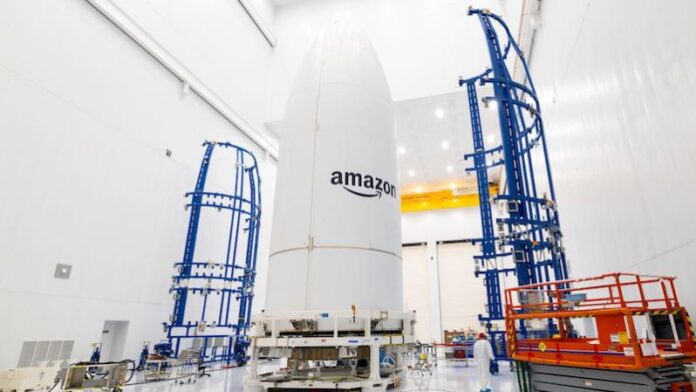Amazon Project Kuiper Satellite Launch Delayed Due To Weather: Amazon’s ambitious Project Kuiper satellite internet venture is poised to change the way the world is connected to the web—beginning with the pending KA-01 mission. While the April 9, 2025, launch was postponed due to adverse weather, the excitement is building as Amazon readies 27 cutting-edge satellites to be launched into Low Earth Orbit (LEO). With more than 3,200 satellites on the drawing board and over 80 launches in the pipeline, Project Kuiper represents Amazon’s serious foray into space-based broadband.
KA-01 Mission: A Giant Leap Toward Universal Internet Access
The KA-01 mission is scheduled to be launched from Cape Canaveral Space Force Station in Florida aboard the ULA Atlas V rocket. The 27 satellites at an altitude of 450 km will mark the start of a humongous constellation that will provide quick, low-latency internet across the globe. This launch is loaded with the Atlas V’s heaviest payload, courtesy of five solid rocket boosters and a 77-foot-tall payload fairing.
Every satellite in this mission features improved capabilities over previous prototypes. Improvements include phased array antennas, onboard processors, high-efficiency solar arrays, new propulsion systems, optical inter-satellite links, and specialized coatings to minimize reflection—avoiding interference with astronomy.
Also read: Michelle Obama Addresses Divorce Rumors On Podcast: Is She Divorcing Barack?
What is Amazon Project Kuiper?
Project Kuiper is Amazon’s global broadband program created to extend high-speed internet to unserved and underserved populations. Funded by Amazon Web Services (AWS) and more than 2,000 experts, Kuiper will enable homes, businesses, schools, hospitals, and even government institutions. The initial customer services should start by the end of 2025.
Massive Launch Collaboration and Infrastructure
Project Kuiper has already signed contracts with the largest launch providers such as Arianespace, SpaceX, Blue Origin, and ULA. The deals account for over 80 rocket launches—the biggest commercial satellite launch contract ever. This project is not just about connectivity; it also provides employment for thousands of people in the U.S. and Europe, making it a major economic and technological endeavor.
Technological Advantage and Safety Features
The Kuiper system is constructed through advanced technology: LEO satellites, small and inexpensive customer ground terminals, and AWS-based ground infrastructure. Amazon prioritizes ethical space practices—designing to minimize space junk and collaborating with astronomers to keep the night sky darker for more transparent skies.
Looking Ahead: KA-02 and Beyond
Even before KA-01 leaves the ground, planning is already in motion for the KA-02 mission, once again on an Atlas V. Subsequent launches will keep growing Amazon’s satellite constellation toward full network connectivity. Data will move from internet sources to ground stations, bounce off satellites, and arrive at users through terminal antennas—providing an uninterrupted broadband experience even in the most remote areas.
Conclusion
Project Kuiper is not merely another satellite launch—it’s a revolutionary move toward closing the global digital divide. Even with the weather setback, the KA-01 mission on the horizon promises better access to education, work-from-home opportunity, and digital empowerment globally. With the Assam HSLC Results 2025 and other academic milestones on the horizon, this announcement comes at a crucial juncture—reshaping the future of learning, communication, and opportunity.
FAQs about Amazon Project Kuiper and KA-01 Mission
Q1. What is Amazon’s Project Kuiper?
Amazon’s Project Kuiper is a satellite-based broadband initiative aimed at providing high-speed internet access to underserved and remote areas across the globe using a constellation of Low Earth Orbit (LEO) satellites.
Q2. What is the KA-01 mission under Project Kuiper?
KA-01 is the first official satellite launch mission of Project Kuiper, set to deploy 27 advanced satellites into Low Earth Orbit (LEO) to begin forming Amazon’s global internet network.
Q3. Why was the KA-01 launch postponed?
The KA-01 launch, originally scheduled for April 9, 2025, from Cape Canaveral, was postponed due to adverse weather conditions.
Q4. When will Amazon Project Kuiper begin offering internet services?
Amazon plans to start providing broadband internet services from Project Kuiper to customers by the end of 2025.
Q5. How many satellites will Project Kuiper launch in total?
Project Kuiper aims to deploy more than 3,200 satellites in total, supported by over 80 scheduled rocket launches in partnership with major aerospace companies.
Q6. Who are the launch partners for Project Kuiper?
Amazon has signed agreements with ULA, Blue Origin, SpaceX, and Arianespace to conduct the satellite launches for Project Kuiper.








